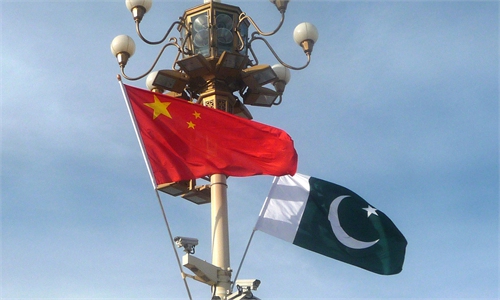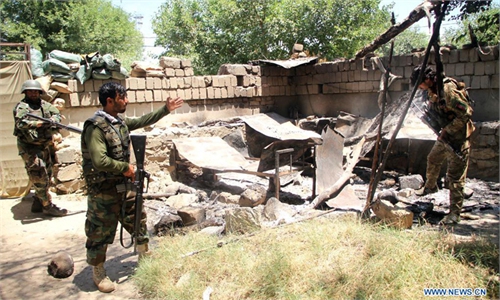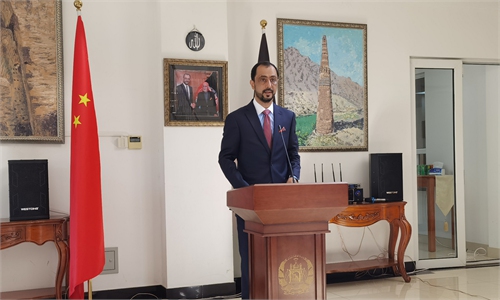Update: China helps Afghan peace with trilateral mechanism
Providing platforms to create conducive conditions after US irresponsible withdrawal

A woman observes the scene of an attack a day after a car bomb went off in Herat, Afghanistan, March 13, 2021. Photo: IC
Together with Pakistan, China has shown responsibility and determination in helping Afghanistan's security and rebuilding after the irresponsible withdrawal of the US troops, Chinese experts said, as China's State Councilor and Foreign Minister Wang Yi hosted the fourth China-Afghanistan-Pakistan Trilateral Foreign Ministers' Dialogue via video link on Thursday.
The three foreign ministers reached a consensus on promoting the peace process in Afghanistan and anti-terrorism and security cooperation, the Xinhua News Agency reported.
Wang Yi said that the current international and regional situations are undergoing complex and profound changes, and the security and stability of Afghanistan and the region are facing new challenges, with foreign troops' withdrawal from Afghanistan accelerated, the peace and reconciliation process in Afghanistan impacted, and armed conflicts and terrorist activities becoming more frequent.
Under such circumstances, it is more necessary for the three countries to strengthen communication and cooperation to make the situation in Afghanistan more conducive to the common interests of Afghanistan and other countries in the region, Wang said.
During the meeting, Wang and Afghan Foreign Minister Mohammad Haneef Atmar and Pakistani Foreign Minister Shah Mahmood Qureshi reached a consensus on the Afghan peace and reconciliation process, and trilateral cooperation.
They stressed that the solution to the Afghan issue should fully reflect the principle of "Afghan-led and Afghan-owned," support Afghanistan in becoming an independent, sovereign and neutral country, pursuing a moderate Muslim policy, firmly fighting against terrorism, and maintaining friendly ties with other countries, especially neighboring countries.
The foreign ministers also urged strengthened efforts to combat the “East Turkistan Islamic Movement” and other terrorist forces, so as to safeguard regional security and stability.
Since the mechanism was set up under China's initiative in 2017, three sessions had been held making this an important platform for the three countries to enhance mutual trust and promote cooperation.
On April 14, US President Joe Biden announced the withdrawal of all American troops from Afghanistan before September 11, along with NATO troops.
There have been mounting worries about the security situation in Afghanistan since Biden's announcement. Combatants on both sides, the Taliban and the Afghan government, as well as civilians have reportedly been killed in growing numbers since the start of May.
Afghanistan has been suffering for the past two decades and the presence of US troops there has not helped achieve any positive political outcomes, analysts said, noting political stability in Afghanistan will become a major issue after the irresponsible departure of the US.
On Tuesday, Afghan Ambassador Javid Qaem said at a press meeting that China can play a major role in regional peace. The ambassador said that Afghanistan is willing to join any sincere initiative that will help facilitate peace in Afghanistan and the region.
The current conditions for Afghanistan's peaceful development are not that bright. There are still many uncertainties. If US troops will leave but CIA paramilitary forces stay in the country and maintain obscure ties with the local armed forces in Afghanistan, it would also be a time bomb to regional peace, Lü Xiang, a research fellow at the Chinese Academy of Social Sciences, told the Global Times on Wednesday.
Consultations and policy coordination among the three governments on the latest developments in the region are timely and vital, Lü said, noting that as a responsible country, China can offer Afghanistan a platform for negotiations and can gather resources from various partners to support the country's development.
The trilateral dialogue will set an example and pave way for more regional dialogue mechanisms on Afghanistan, Zhao Gancheng, a research fellow at the Shanghai Institute for International Studies, told the Global Times on Thursday.
In a phone conversation in mid-May, Wang Yi told Hamdullah Mohib, national security advisor to the Afghan president, that China is ready to facilitate internal negotiations among various parties in Afghanistan, including creating the conditions for negotiations in China.
"China and Pakistan play a role of promoting peaceful talks and maintaining stability, which also aims to create external conditions that are conducive to a smooth and constructive adjustment within Afghanistan," Li Haidong, professor at the Institute of International Relations of China Foreign Affairs University, told the Global Times on Wednesday.
The trilateral dialogue also shows that the Afghan people trust Pakistan and China, according to Li. "China and Pakistan are all-weather strategic cooperative partners, which means that the two countries are bound to work together on important issues of security in Central Asia."
The future of Afghanistan is a major issue affecting regional security and Afghanistan needs to advance consultations with neighboring countries in a way that is in line with its own interests and those of its neighbors, experts said.
A stable Afghanistan would be an oasis in the heart of Central Asia, and if Afghanistan is unstable or becomes a sanctuary for religious extremists and terrorists, it will be a security problem for all the countries around it, said Li, adding that if terrorists and extremist religious forces gain a foothold in the country, it will threaten security and stability in China's Xinjiang Uygur Autonomous Region and Tibet Autonomous Region.
The peace and reconciliation process of Afghanistan needs cooperation among countries not just China and Pakistan, Zhao said, noting that the Afghanistan issue will also be an important agenda for the Shanghai Cooperation Organization.
In early May, Wang Yi stressed the Central Asian countries' contribution to the Afghan issue during talks with foreign ministers of countries, including Uzbekistan and Tajikistan who came to China to attend the China+Central Asia (C+C5) Foreign Ministers' Meeting in Xi'an, Shaanxi Province.
Wang Yi said that as close neighbors of Afghanistan, Central Asian countries should make due contributions to the final settlement of the Afghan issue, and the Shanghai Cooperation Organization should also play its role in the long-term peace and stability in Afghanistan




